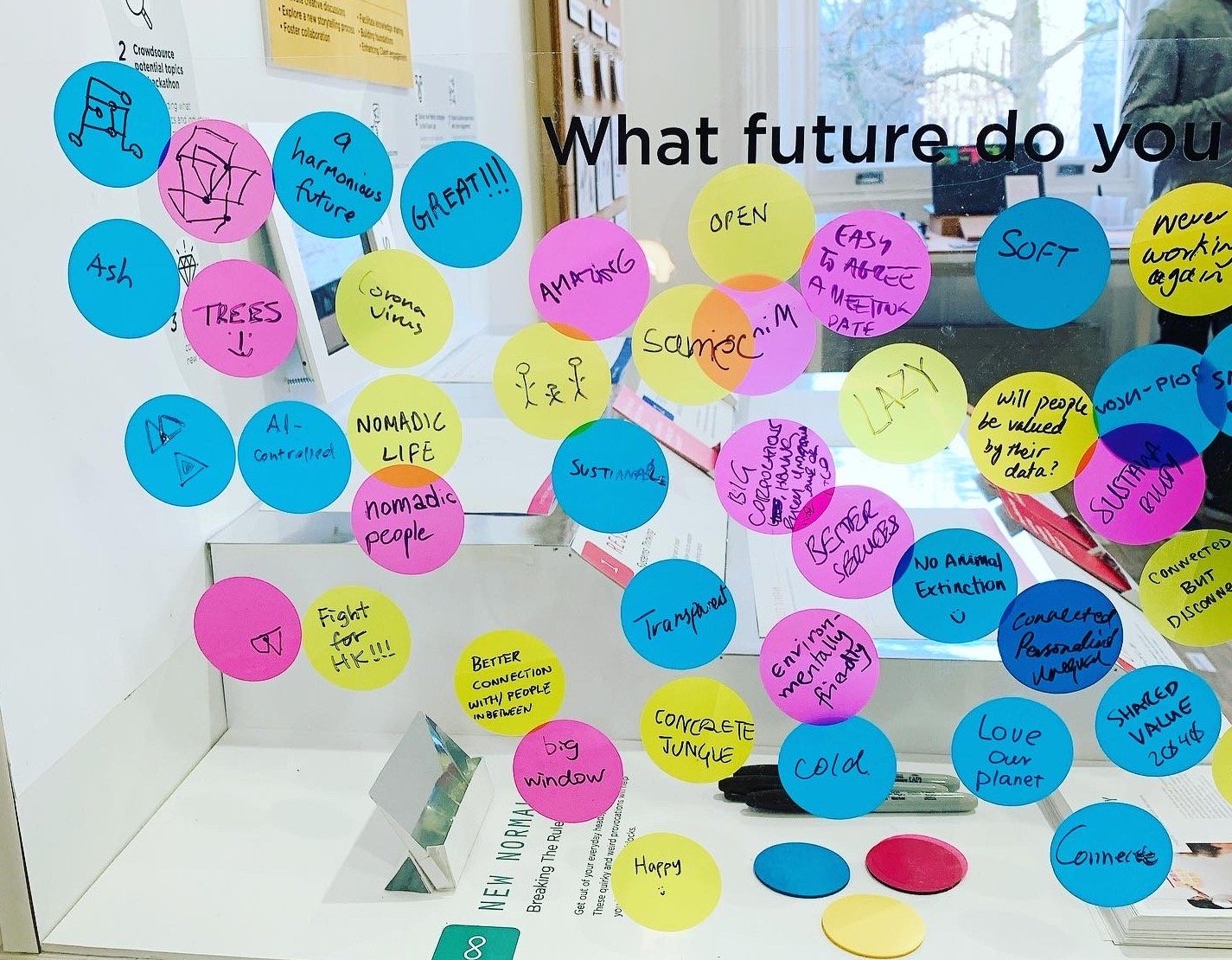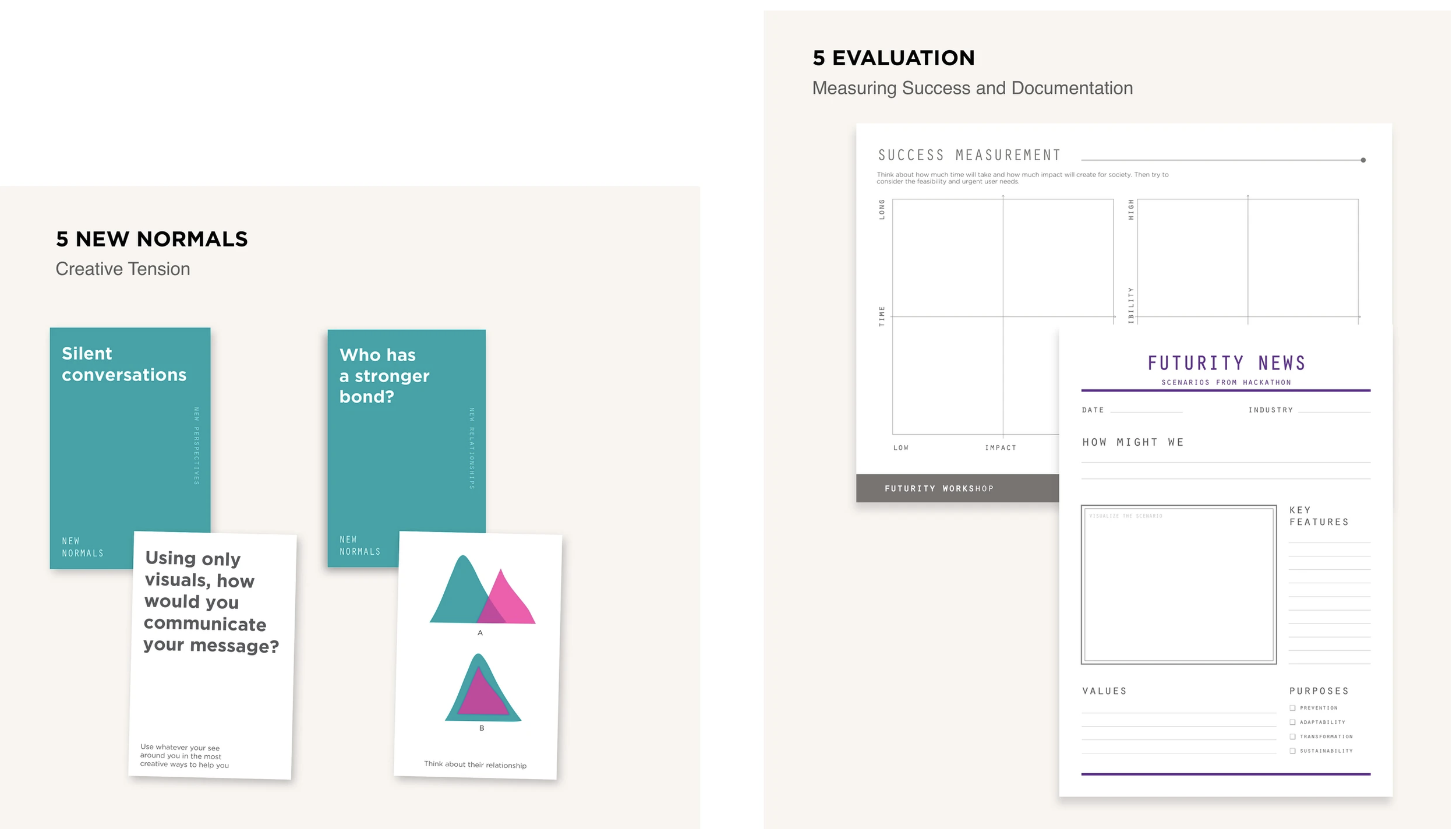Speculating the future of Consultancies with Futurity Works
Thoughtworks is a global software consultancy providing technology solutions to solve complex problems. They help clients strengthen their core technology, scale with flexibility and create seamless digital experiences to achieve business goals.
Client:
Industry:
Business & Technology
How might we help consultancies attain a competitive advantage, through transforming their current work practice?
Attaining a competitive edge by transforming the design thinking mindset and practice within Thoughtworks.
Opportunity 💡
A test bed to identify the future of consultancies.
Given that change that is everlasting, and businesses aim to stay ahead of their competition, we thought about the preferable future environment in which they can exploit their existing capabilities and explore new capabilities.
Stakeholder personas
Customer experience
Business & Strategy
Mindset Shift
Future thinking concepts
Outcomes 📤
Skills Involved 📩
Qualitative research
Quantitative research
Discovery sessions
Concept Testing and Iteration
Workshop Toolkit and Framework Development
Understanding the Problem 💬
Scanning the landscape
We began by conducting desk research to understand the trends, challenges and project cycles of software consultancies, as well as the topics we were interested in regarding the industry.
With a broad brief, we let our research and findings help uncover the problem to solve.
The 3 tiered relationships between different parties and the opportunity areas:
Thoughtworks → Their Clients → End Customers
Uncovering deeper insights through interviews
We then interviewed 25 employees from various departments, such as Engineering, Marketing, Business Development and Design.
We had insights on their roles, the dynamics between teams, challenges they may have faced at their workplace, and any market changes that they foresee, that should be taken into consideration.
After several in-person and online research sessions, we identified 4 major issues:
Key Insights 📝
👎🏼 Problem solving oriented
Thoughtworks was known for being delivery oriented, and for solving problems at the tail end of systems.
👎🏼 “Quick fix” solutions for the short term
They opted for quantity more than quality, and had been solving quick problems, such as malware issues. Their identity in the market slowly became that of a delivery oriented solution provider, whereas they desired to be more strategic and research oriented.
With a focus on the short term, TW did not realise they were losing opportunities to lead. Instead they were being reactive and following the wave of the market.
👎🏼 Reactive to market changes
Some of the employees were eager to bring change to the existing practices in order to adapt to the emerging needs of clients but there was clear misalignment between the upper and lower management.
👎🏼 Internal misalignments in vision
Opportunity Analysis through Rapid Prototyping
Post insights gathering, we created low-fi concepts, and tested them with our client leads.
To ensure a balanced perspective, we also involved creative heads from the departments who were eager to bring about change. This form of rapid prototyping helped us quickly adapt our solutions and land on a co-created vision for Thoughtworks.
New Insights based on concept testing 📝
After rapid prototyping and concept testing, some new, but key insights surfaced:
👎🏼 Lack of creative initiative
👎🏼 Monotonous work structure
👎🏼 Absence of hands-on practices
👎🏼 Poor storytelling ability while pitching to clients
A deeper and more fundamental approach was required to create a sustainable shift in TW’s approach to their work, if they wanted to position themselves as a strategic consultancy and be more proactive to prepare for their future.
Introducing Futurity Works
A 2 pronged solution for consultancies such as Thoughtworks, Futurity Hack and Futurity Lab
Futurity Works aims to create adaptability towards the future, helping businesses prepare for emerging needs of clients and unlock imagination for future scenarios, through a hybrid engagement modality. We want to ensure that our model is sustainable and flexible for the long run.
As a future driven hackathon, Futurity Hack helps employees take a break from their day to day work, and enter a creative space, where they collaboratively imagine, challenge and break boundaries.
Aiming to equip consultancies with strategies, such as storytelling, a future-driven mindset was key, with in-person coaching and comprehensive toolkits.
The project teams will be encouraged to conduct the workshop with clients after practising it internally to showcase their strategic foresight and build confidence with clients.
Part 1 - Futurity Hack
Click on video to playThis is an overview of the Hackathon.
Research topics are crowdsourced from within the company with employees finding “non work related” projects and topics they are passionate about.The idea of crowdsourcing poses as an excellent opportunity for them to do so. For example, participants could wish to work on Healthcare in the year 2050.
Once determined, the workshop is set. Participants are then introduced to the toolkit.
FUTURITY HACK TOOLKIT
Part 2 - Futurity Lab
The second part of the service enables longevity and ensures the strategies arising from Futurity Hack are consolidated and stored for future reference.
Futurity Lab is a intelligent collective platform, allowing consultants/employees to share their strategies across the company, as well as with clients when required.
It also aims to auto consolidate data into categories, based on common themes, such as technology trends, behaviour changes and market trends.
Challenges of Futurity Lab
Cultural transformation, Cost and value creation, Behaviour and mindset change, Methodology adaption and Resource allocation.
Prototyping and Iteration
2 Validation Sessions
Prompt for the sessions:
“What will hospitals look like in 2050?”
We organised 2 validation sessions to test our idea with employees at Thoughtworks. This included a spread of roles to ensure we account for the various types of employees.
As the lead facilitator of the hackathons, I ran through the session ensuring each participant was well guided, while my team members assisted in maintaining the flow and encouraging active participation.
We tested for the usability of the service and the relevance and value of it in their everyday work.
Feedback and Iteration
We garnered positive feedback on the toolkit and worksheets. We were told the content and play was very intriguing and could inspire them to come up with interesting scenarios through interactive discussions.
Futurity Works was presented to multiple external stakeholders, and we received a lot of interest from the likes of Ministry of Justice and other industry players.
“I think this service can help build long term relationships with our clients and increase the value of the solutions we provide.” - Engineering Lead, Thoughtworks
The executive plan for Futurity Works






